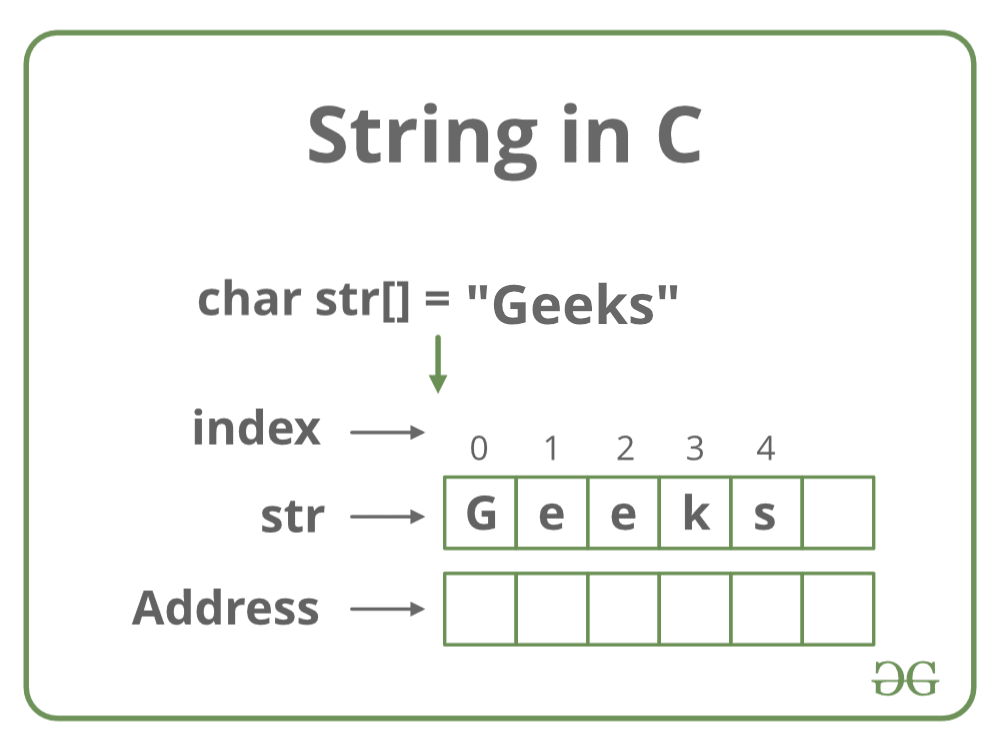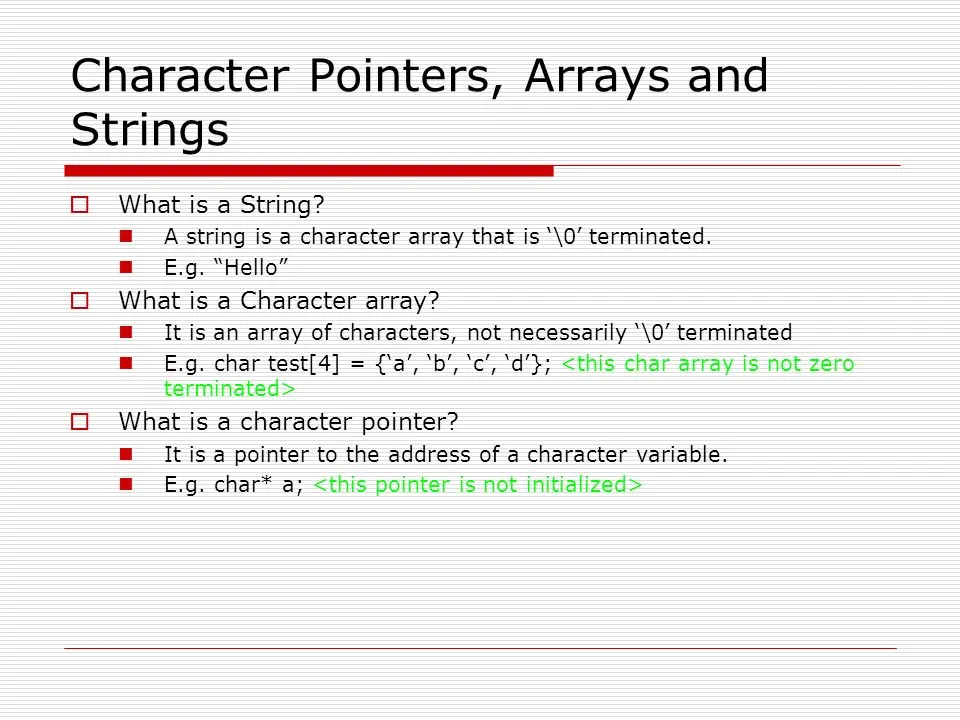Programming is all about solving problems, and when it comes to programming in C or C++, one of the most fundamental problems you’ll face is dealing with strings.
Strings are sequences of characters, and in C and C++, there are two primary ways of representing them: using character arrays (char[]) or character pointers (char*). While both of these data types can be used to represent strings, they differ in several important ways.
char* refers to a pointer character in C++ that points to the location of the first character of a character array, whereas char[] is a character array that is a place of storage for the characters of a string.
In this article, we’ll explore the difference between char* and char[] and help you understand when to use each one.
What Is A Character Array (char[])?
A character array (char[]) is a fixed-length array of characters. When you declare a character array, you’re specifying the number of characters it can hold.
For example, the following code declares a character array called myString that can hold up to 10 characters:
Code: char myString[10];

Once you’ve declared a character array, you can assign values to it just like any other array. For example, the following code assigns the string “Hello” to myString:
Code:
char myString[10];
myString[0] = ‘H’;
myString[1] = ‘e’;
myString[2] = ‘l’;
myString[3] = ‘l’;
myString[4] = ‘o’;
myString[5] = ‘\0’;
In the code above, we’re assigning the string “Hello” to myString one character at a time. We also include the null character ('\0') at the end of the string to mark the end of the string.
This is important because C and C++ don’t store the length of a string explicitly, so you need to use the null character to indicate the end of the string.
What Is A Character Pointer (char*)?
A character pointer (char*) is a variable that stores the memory address of a character (or a sequence of characters) in memory.
Unlike a character array, a character pointer doesn’t have a fixed length. Instead, it can point to a sequence of characters of any length.
To declare a character pointer, you use the * symbol. For example, the following code declares a character pointer called myStringPtr:
Code: char* myStringPtr;

Once you’ve declared a character pointer, you need to assign it a value. The value you assign to a character pointer is the memory address of a character (or a sequence of characters) in memory.
For example, the following code assigns the memory address of the string “Hello” to myStringPtr:
Code:
char* myStringPtr;
myStringPtr = “Hello”;
In the code above, we’re assigning the memory address of the string “Hello” to myStringPtr. This means that myStringPtr is now pointing to the first character in the string “Hello”.
Note that we didn’t include the null character ('\0') at the end of the string when we assigned it to myStringPtr. This is because the compiler automatically includes the null character when it initializes a character pointer with a string literal.
Differences Between Char* and Char[]?
Here’s a table summarizing the differences between character arrays and character pointers:
| Character Arrays | Character Pointers |
|---|---|
| Fixed-size | Can point to a string of any length |
| Memory managed by the system | Memory management is the programmer’s responsibility |
| Accessed using array indexing syntax | Accessed using pointer arithmetic |
| Individual elements can be modified directly | The string is stored in read-only memory, so modifying individual elements is not allowed |
| Passing a copy of the array to a function | Passing a reference to the original string to a function |
Now that we understand what character arrays and character pointers are, let’s explore their differences.
1. Length
One of the primary differences between character arrays and character pointers is their length. Character arrays have a fixed length, which means that you need to know the maximum length of a string in advance.
If you try to assign a string that is longer than the maximum length of the array, you’ll run into problems.
On the other hand, character pointers don’t have a fixed length. This means that you can assign a character pointer to a string of any length, as long as you have enough memory to store it.
2. Memory Management
Another difference between character arrays and character pointers is the way they manage memory. When you declare a character array, the compiler allocates memory for it on the stack.
Whereas, when you use a character pointer, you need to allocate memory for it yourself. This means that you need to use functions like malloc() and calloc() to allocate memory for the string.
When you’re done with the string, you also need to free the memory yourself using the free() function.
3. Accessing Elements
With a character array, you can access individual elements using array indexing syntax, like myString[0]. This makes it easy to access individual characters in a string.
With a character pointer, you need to use pointer arithmetic to access individual elements. For example, if you want to access the first character in a string pointed to myStringPtr, you can use the syntax *myStringPtr.
To access the second character, you would use the syntax *(myStringPtr + 1).
4. Modifying Strings
With a character array, you can modify the individual elements of the array using array indexing syntax. For example, you can change the first character of a string by assigning a new value to myString[0].
With a character pointer, you can’t modify the individual elements of the string directly. This is because the string is stored in read-only memory.
If you try to modify the string, you’ll run into undefined behavior. To modify a string pointed to by a character pointer, you need to allocate a new block of memory, copy the original string to the new memory, modify the string in the new memory, and then free the original memory.
5. Passing to Functions
One final difference between character arrays and character pointers is how you pass them to functions. When you pass a character array to a function, you’re passing a copy of the array.
This means that any modifications you make to the array inside the function won’t be reflected outside the function.
On the other hand, when you pass a character pointer to a function, you’re passing a reference to the original string. This means that any modifications you make to the string inside the function will be reflected outside the function.
When Should You Use Char* And Char[]?
Now that we’ve explored the differences between character arrays and character pointers, you may be wondering when you should use each one. Here are some general guidelines:
Use Char[] When:
- You know the maximum length of the string in advance.
- You don’t need to modify the string.
- You don’t need to pass the string to a function that modifies it.
Use Char* When:
- You don’t know the maximum length of the string in advance.
- You need to modify the string.
- You need to pass the string to a function that modifies it.
FAQS (Frequently Asked Questions)
Can I use char* and char[] interchangeably in my program?
No, you cannot use char* and char[] interchangeably. While they are both used to represent strings of characters, they have different memory management and access methods.
Char[] is a fixed-size array that is managed by the system, while char* is a pointer to a character string that must be manually allocated and managed.
Additionally, accessing elements in char[] is done through array indexing syntax, while accessing elements in char* requires pointer arithmetic.
Which is more efficient, using char* or char[]?
The efficiency of using char* or char[] depends on the specific requirements of your program. Char[] is more efficient for fixed-size strings that do not need to be modified, as the memory is managed by the system and no additional allocation or deallocation is required.
Char* is more efficient for strings of varying lengths or those that need to be modified, as memory can be allocated and deallocated as needed. However, manual memory management can be more error-prone and can lead to memory leaks or segmentation faults if not done correctly.
Can I pass char[] to a function that expects char*?
Yes, you can pass char[] to a function that expects char*. The function accepts a pointer to the first element of an array when an array is passed to a function.
When you pass an array to a function, the function receives a pointer to the first element of the array. However, it’s important to note that passing char[] to a function involves passing a copy of the array while passing char* to a function involves passing a reference to the original string.
This can affect memory usage and performance, so it’s important to choose the appropriate data type based on your program’s specific needs.
Conclusion
The difference between character arrays and character pointers is an important concept in C and C++ programming. While both data types are used to represent strings of characters, they have some key differences that make them suitable for different cases.
Character arrays are fixed in size and managed by the system, making them a good choice when the maximum length of the string is known in advance and you don’t need to modify the string.
On the other hand, character pointers can point to strings of any length and require the programmer to manage memory, making them a good choice when the length of the string is unknown or when modifications to the string are necessary.
By understanding the differences between character arrays and character pointers, programmers can make informed decisions about which data type to use for a given task, leading to more efficient and effective code.

![What Is The Difference Between char* And char[]? (Understand)](https://allthedifferences.com/wp-content/uploads/2023/03/WhatsApp-Image-2023-01-15-at-11.20.09-PM-300x173-2.jpeg.webp)